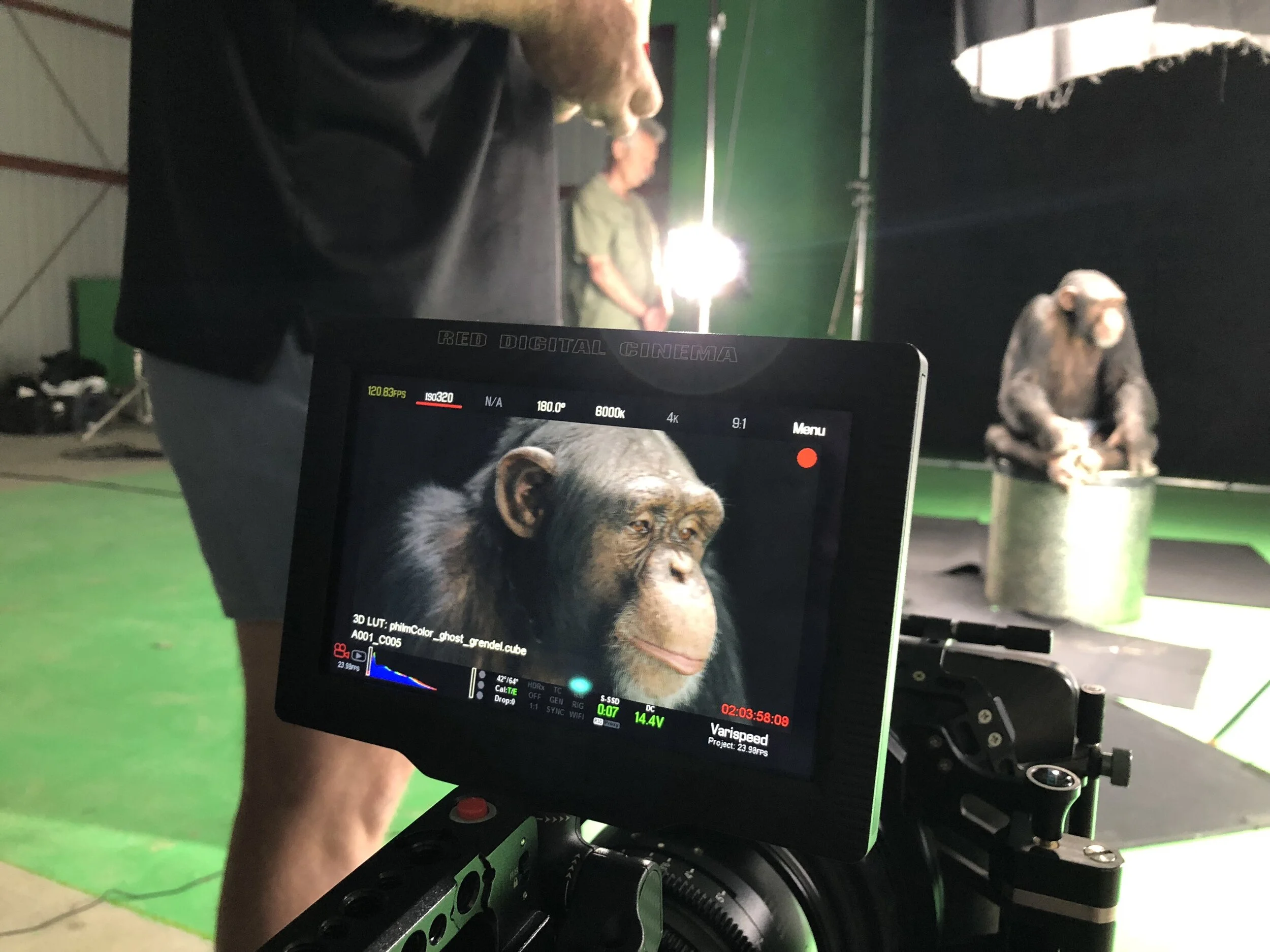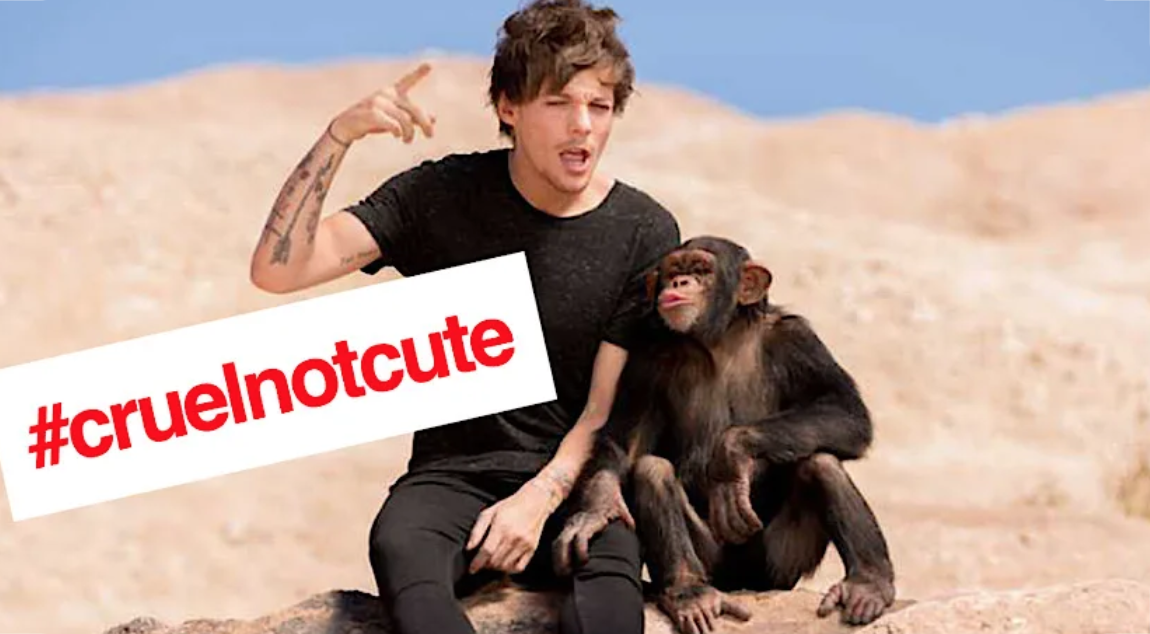
LOGLINE | The Last Chimpanzee (working title), follows the final working days and retirement of the very last working great ape in Hollywood and what happens after the spotlight turns off, but life moves on.
IN THE PRESS
Can These Ex-Hollywood Chimps Find a Place Among the Apes?
It was a rainy morning at the Lincoln Park Zoo, and at the chimpanzee exhibit, it was the children who were hooting and hollering. The apes themselves were placid, ignoring their rowdy audience as they foraged for leaves and swayed in small hammocks.
But hidden behind the scenes, out of public view, lived another group of chimps who were far less sanguine about strangers. And when they spotted two unfamiliar visitors, they rushed over to the edge of their enclosure. Eli, a gentle young adult, approached with his hair standing on end. Then Susie, a small but strong-willed female, spotted a photographer and began to shriek.
Hollywood's Last Actor Chimp in Need of Permanent Home
From Ronald Reagan co-star Bonzo to the Today show's J. Fred Muggs and Bear in B.J. and the Bear, chimpanzees have been appearing in movies and on TV for more than eight decades. That all but came to an end in 2018, the year that Eli, the last chimpanzee professionally trained to act in Hollywood, appeared in his final movie, the Bollywood film Zero. Eli — whose key trick was taking someone's glasses and putting them on — is now awaiting placement in a forever home.
Having been let go by Working Wildlife (which specializes in providing exotic species for entertainment productions), he was dropped off in March at a financially struggling nonprofit sanctuary near Angeles National Forest, just outside of Los Angeles. The facility shut down in August, and Eli and more than 40 other chimps, many of whom arrived from research labs, have since been under the on-site care of the California Department of Fish and Wildlife. “We are currently in discussion with a high-quality facility that may provide a permanent home for Eli,” says Kirsten Macintyre, a spokeswoman for the state agency.
The Book of Eli (The Chimp): Hollywood’s Last Trained Primate Bows Out of His Forced Profession As Hollywood Chooses Respect For Animals Over Profits
“No animals were harmed in the making of this film” is a widely recognized sentiment attached to the end credits of filmed media featuring the use of animals. The American Humane Society has exclusive jurisdiction over the fair and ethical treatment of animals in media. The non-profit organization oversees the use of animal actors in American-produced film and television productions. In recent years, the wellbeing of animals in entertainment has become a primary concern and a controversial topic.
On May 17, 2017, the Ringling Brothers and Barnum and Bailey Circus ended their 146-year run under the Big Top. Long, costly legal battles with animal rights activists coupled with weakening attendance led to the final curtain call. It was clear – crowds didn’t want to see animals being forced to perform against their primal instincts. The same partiality was projected onto animal actors, especially those of exotic breeds.
‘Actor’ Chimp From One Direction Video And More Will Soon Live At Lincoln Park Zoo
CHICAGO — Two chimpanzee who were trained as “actors” are coming to Lincoln Park Zoo.
The chimps, 11-year-old Eli and 13-year-old Susie, were trained to perform, appearing in music videos, ads and movies. But they were “deemed unsuitable for such work after just a few short years, despite most chimpanzees living for many decades,” according to Lincoln Park Zoo.
So Eli, a boy, and Susie, a girl, went to live at an unaccredited wildlife facility in California. The facility closed in August, though, leaving more than 40 chimps — including Eli and Susie — without a home, according to the Lincoln Park Zoo.
Experts worked for months on finding suitable homes for the primates.
SYNOPSIS
In 2018, the legacy of Hollywood’s Great Ape Actors came to a definitive end with the retirement of Eli, the last working Chimpanzee, who performed his final scenes as an “astronaut chimp” in the feature film, ZERO. It was the final act of a nearly eighty-year era of Chimpanzees in film and television. However, this event did not finish to great fanfare or farewell, but rather a quiet and unobserved exit out the backstage door of Hollywood.
This 4 part docuseries follows the final working days of the last working Hollywood Chimpanzee. With his baby teeth falling out and his canines growing in, Eli’s increased size and frequent outbursts, growing tantrums, and aggressive behavior make filming increasingly difficult and risky. What starts out as a shared space between co-stars ultimately ends up in a quarantine process where Eli is separated from all cast and crew and relegated to shooting exclusively on green-screen for the safety of his fellow human performers.
At nine years old, Eli is already beyond the age most animal trainers would allow a chimp to work. This is due to the extraordinary strength and ultimate aggression a chimp exhibits as they get older and hit maturity. His handlers, however, are not most animal trainers. Veteran wild animal trainer, Steve martin (Steve Martin’s Working Wildlife) has been working with animals in the entertainment industry for over five decades, on projects as diverse as I Dream Of Jeannie to Dances with Wolves. Alongside him is veteran primate trainer, Keith Bower (The Clan of the Cave Bear, The Jungle Book). In spite of their combined experience, even these seasoned trainers have their concerns about Eli’s ability to perform, and more importantly, the safety of the other cast and crew, which includes the film’s leads, Bollywood megastars, Shahrukh Kahn and Anushka Sharma.
Our docuseries provides access to this seldom seen process, as well as underpin a broader narrative of the ethics of working animals, particularly those who share 96% of our (human) DNA. With shifting federal laws impacting the endangered species act, coupled with an industry where computer generated animation is increasingly taking over the spotlight and animal rights organizations wielding great power and influence through Hollywood and beyond, the spot light is dimming on the future of a profession that once had a significant impact on our entertainment.




